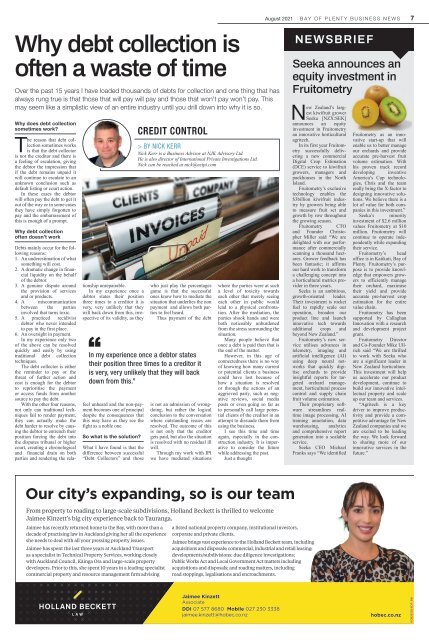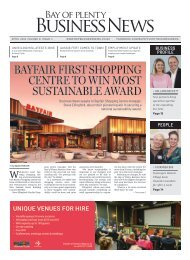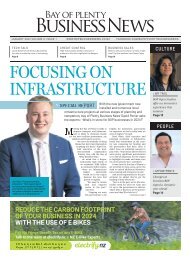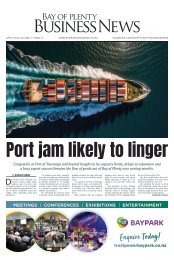August 2021 - Bay of Plenty Business News
From mid-2016 Bay of Plenty businesses have a new voice, Bay of Plenty Business News. This new publication reflects the region’s growth and importance as part of the wider central North Island economy.
From mid-2016 Bay of Plenty businesses have a new voice, Bay of Plenty Business News. This new publication reflects the region’s growth and importance as part of the wider central North Island economy.
You also want an ePaper? Increase the reach of your titles
YUMPU automatically turns print PDFs into web optimized ePapers that Google loves.
<strong>August</strong> <strong>2021</strong> BAY OF PLENTY BUSINESS NEWS 7<br />
Why debt collection is<br />
<strong>of</strong>ten a waste <strong>of</strong> time<br />
Over the past 15 years I have loaded thousands <strong>of</strong> debts for collection and one thing that has<br />
always rung true is that those that will pay will pay and those that won’t pay won’t pay. This<br />
may seem like a simplistic view <strong>of</strong> an entire industry until you drill down into why it is so.<br />
Why does debt collection<br />
sometimes work?<br />
The reason that debt collection<br />
sometimes works<br />
is that the debt collector<br />
is not the creditor and there is<br />
a feeling <strong>of</strong> escalation, giving<br />
the debtor the impression that<br />
if the debt remains unpaid it<br />
will continue to escalate to an<br />
unknown conclusion such as<br />
default listing or court action.<br />
In these cases the debtor<br />
will <strong>of</strong>ten pay the debt to get it<br />
out <strong>of</strong> the way or in some cases<br />
they have simply forgotten to<br />
pay and the embarrassment <strong>of</strong><br />
this is enough <strong>of</strong> a prompt.<br />
Why debt collection<br />
<strong>of</strong>ten doesn’t work<br />
Debts mainly occur for the following<br />
reasons:<br />
1. An underestimation <strong>of</strong> what<br />
something will cost.<br />
2. A dramatic change in financial<br />
liquidity on the behalf<br />
<strong>of</strong> the debtor.<br />
3. A genuine dispute around<br />
the provision <strong>of</strong> services<br />
and or products.<br />
4. A miscommunication<br />
between the parties<br />
involved that turns toxic.<br />
5. A practiced recidivist<br />
debtor who never intended<br />
to pay in the first place.<br />
6. An oversight in payment.<br />
In my experience only two<br />
<strong>of</strong> the above can be resolved<br />
quickly and easily by using<br />
traditional debt collection<br />
techniques.<br />
The debt collector is either<br />
the reminder to pay or the<br />
threat <strong>of</strong> further action and<br />
cost is enough for the debtor<br />
to reprioritise the payment<br />
or access funds from another<br />
source to pay the debt.<br />
With the other four reasons,<br />
not only can traditional techniques<br />
fail to render payment,<br />
they can actually make the<br />
debt harder to resolve by causing<br />
the debtor to entrench their<br />
position forcing the debt into<br />
the disputes tribunal or higher<br />
court, creating a chronological<br />
and financial drain on both<br />
parties and rendering the relationship<br />
unrepairable.<br />
In my experience once a<br />
debtor states their position<br />
three times to a creditor it is<br />
very, very unlikely that they<br />
will back down from this, irrespective<br />
<strong>of</strong> its validity, as they<br />
feel unheard and the non-payment<br />
becomes one <strong>of</strong> principal<br />
despite the consequences that<br />
this may have as they see the<br />
fight as a noble one.<br />
So what is the solution?<br />
What I have found is that the<br />
difference between successful<br />
“Debt Collectors” and those<br />
CREDIT CONTROL<br />
> BY NICK KERR<br />
Nick Kerr is a <strong>Business</strong> Advisor at NJK Advisory Ltd.<br />
He is also director <strong>of</strong> International Private Investigations Ltd.<br />
Nick can be reached at nick@nzipi.com<br />
who just play the percentages<br />
game is that the successful<br />
ones know how to mediate the<br />
situation that underlies the non<br />
payment and allows both parties<br />
to feel heard.<br />
Thus payment <strong>of</strong> the debt<br />
In my experience once a debtor states<br />
their position three times to a creditor it<br />
is very, very unlikely that they will back<br />
down from this.”<br />
is not an admission <strong>of</strong> wrongdoing,<br />
but rather the logical<br />
conclusion to the conversation<br />
where outstanding issues are<br />
resolved. The outcome <strong>of</strong> this<br />
is not only that the creditor<br />
gets paid, but also the situation<br />
is resolved with no residual ill<br />
will.<br />
Through my work with IPI<br />
we have mediated situations<br />
where the parties were at such<br />
a level <strong>of</strong> toxicity towards<br />
each other that merely seeing<br />
each other in public would<br />
lead to a physical confrontation.<br />
After the mediation, the<br />
parties shook hands and were<br />
both noticeably unburdened<br />
from the stress surrounding the<br />
situation.<br />
Many people believe that<br />
once a debt is paid then that is<br />
the end <strong>of</strong> the matter.<br />
However, in this age <strong>of</strong><br />
connectedness there is no way<br />
<strong>of</strong> knowing how many current<br />
or potential clients a business<br />
could have lost because <strong>of</strong><br />
how a situation is resolved<br />
or through the actions <strong>of</strong> an<br />
aggrieved party, such as negative<br />
reviews, social media<br />
posts or even going so far as<br />
to personally call large potential<br />
clients <strong>of</strong> the creditor in an<br />
attempt to dissuade them from<br />
using the business.<br />
I see this time and time<br />
again, especially in the construction<br />
industry. It is imperative<br />
to consider the future<br />
while addressing the past.<br />
Just a thought<br />
NEWSBRIEF<br />
Seeka announces an<br />
equity investment in<br />
Fruitometry<br />
New Zealand’s largest<br />
kiwifruit grower<br />
Seeka [NZX:SEK]<br />
announces an equity<br />
investment in Fruitometry<br />
an innovative horticultural<br />
agritech.<br />
In its first year Fruitometry<br />
successfully delivering<br />
a new commercial<br />
Digital Crop Estimation<br />
(DCE) service to kiwifruit<br />
growers, managers and<br />
packhouses in the North<br />
Island.<br />
Fruitometry’s exclusive<br />
technology enables the<br />
$3billion kiwifruit industry<br />
by growers being able<br />
to measure fruit set and<br />
growth by row throughout<br />
the growing season.<br />
Fruitometry CTO<br />
and Founder Christopher<br />
Miller said “We are<br />
delighted with our performance<br />
after commercially<br />
scanning a thousand hectares.<br />
Grower feedback has<br />
been fantastic; it affirms<br />
our hard work to transform<br />
a challenging concept into<br />
a horticultural metrics provider<br />
in three years.<br />
Seeka is an ambitious,<br />
growth-oriented leader.<br />
Their investment is rocket<br />
fuel to rapidly scale our<br />
operation, broaden our<br />
product line and launch<br />
innovative tech towards<br />
additional crops and<br />
beyond New Zealand.”<br />
Fruitometry’s new service<br />
utilises advances in<br />
telemetry, imaging and<br />
artificial intelligence (AI)<br />
using deep neural networks<br />
that quickly digitise<br />
orchards to provide<br />
insightful reports for targeted<br />
orchard management,<br />
horticultural process<br />
control and supply chain<br />
fruit volume estimation.<br />
Their proprietary s<strong>of</strong>tware<br />
streamlines realtime<br />
image processing, AI<br />
training annotation, data<br />
warehousing, analytics<br />
and comprehensive report<br />
generation into a scalable<br />
service.<br />
Seeka CEO Michael<br />
Franks says “We identified<br />
Fruitometry as an innovative<br />
start-up that will<br />
enable us to better manage<br />
our orchards and provide<br />
accurate pre-harvest fruit<br />
volume estimation. With<br />
his proven track record<br />
developing inventive<br />
America’s Cup technologies,<br />
Chris and the team<br />
really bring the X-factor to<br />
designing innovative solutions.<br />
We believe there is a<br />
lot <strong>of</strong> value for both companies<br />
in this investment.”<br />
Seeka’s minority<br />
investment <strong>of</strong> $2.6 million<br />
values Fruitometry at $10<br />
million. Fruitometry will<br />
continue to operate independently<br />
while expanding<br />
their service.<br />
Fruitometry’s head<br />
<strong>of</strong>fice is in Katikati, <strong>Bay</strong> <strong>of</strong><br />
<strong>Plenty</strong>. Fruitometry’s purpose<br />
is to provide knowledge<br />
that empowers growers<br />
to efficiently manage<br />
their orchard, maximise<br />
their yield and provide<br />
accurate pre-harvest crop<br />
estimation for the entire<br />
value chain.<br />
Fruitometry has been<br />
supported by Callaghan<br />
Innovation with a research<br />
and development project<br />
grant.<br />
Fruitometry Director<br />
and Co-Founder Mike Ullrich<br />
said “We are thrilled<br />
to work with Seeka who<br />
are a significant leader in<br />
New Zealand horticulture.<br />
This investment will help<br />
us accelerate our product<br />
development, continue to<br />
build our innovative intellectual<br />
property and scale<br />
up our team and services.<br />
“Agritech is a key<br />
driver to improve productivity<br />
and provide a competitive<br />
advantage for New<br />
Zealand companies and we<br />
are excited to be leading<br />
the way. We look forward<br />
to sharing more <strong>of</strong> our<br />
innovative services in the<br />
future.”<br />
Our city’s expanding, so is our team<br />
From property to roading to large-scale subdivisions, Holland Beckett is thrilled to welcome<br />
Jaimee Kinzett’s big city experience back to Tauranga.<br />
Jaimee has recently returned home to the <strong>Bay</strong>, with more than a<br />
decade <strong>of</strong> practising law in Auckland giving her all the experience<br />
she needs to deal with all your pressing property issues.<br />
Jaimee has spent the last three years at Auckland Transport<br />
as a specialist in Technical Property Services, working closely<br />
with Auckland Council, Kāinga Ora and large-scale property<br />
developers. Prior to this, she spent 10 years in a leading specialist<br />
commercial property and resource management firm advising<br />
a listed national property company, institutional investors,<br />
corporate and private clients.<br />
Jaimee brings vast experience to the Holland Beckett team, including<br />
acquisitions and disposals; commercial, industrial and retail leasing;<br />
developments/subdivisions; due diligence investigations;<br />
Public Works Act and Local Government Act matters including<br />
acquisitions and disposals; and roading matters, including<br />
road stoppings, legalisations and encroachments.<br />
Jaimee Kinzett<br />
Associate<br />
DDI 07 577 8680 Mobile 027 230 3338<br />
jaimee.kinzett@hobec.co.nz<br />
hobec.co.nz<br />
HOB26338 BOP_BN

















